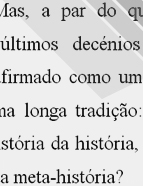

................................
The enunciation marks used (or avoided) by historians is another point of interest. In the case of Magalhães Godinho, the use of the majestic plural to refer to himself is immediately evident (he even uses the designation “we ourselves”). In other historians, personal pronouns are erased, and the historical discourse appears to legitimise itself autonomously— as seen with Jorge Borges de Macedo.
Another unexplored dimension is the fixation on material supports of the memory of historians in urban statuary, painting and decorative arts, in toponymy, plaques, school names, stamps, coins, and illustrated postcards. It would be worthwhile to conduct a historically situated survey not only for Lisbon, Porto, Coimbra, Braga, and Setúbal but also in provincial urban centres where erudite and self-taught historians were represented and contributed to broadening and disseminating knowledge of local memories. It is significant, for example, that the public statues of the greatest figures of 19th-century historiography, Herculano, and Oliveira Martins, date back to the 1950s.
Finally, the near absence of debates in the field of the history of historiography in recent decades should be noted. Yet during the Estado Novo, despite censorship and the absence of freedom of expression, there were frequent historical controversies, many sparked by essayists—such as António Sérgio. Divergent interpretations regarding key moments in national history were confronted: for example, on the formation of Portugal, the nature of the 1383 revolution, the early stages of Portuguese expansion, the Inquisition, the liberal revolution, and the industrial revolution. There were disagreements in these debates regarding the use of key concepts such as revolution, social class, decadence, underdevelopment , or foreign influence. However, in the field of the history of historiography, debates were almost non-existent. Two exceptions should be noted: the extensive critique by J. Barradas de Carvalho of A. José Saraiva’s book on Alexandre Herculano (republished in J. Barradas de Carvalho,, As ideias políticas e sociais de Alexandre Herculano [The political and social ideas of Alexandre Herculano] 1971, pp.235-256) and the critique by A. Borges Coelho of V. Magalhães Godinho regarding the latter’s Ensaios II [Essays II], focusing, among other factors, on periodisation and the concept of a historical and geographical complex (Questionar a História I [Questioning History I], 1983 [1970], pp.287-303). Divergent interpretations emerged—often without citing the names of authors with whom there was disagreement—but controversies among historians were infrequent and circumstantial.
